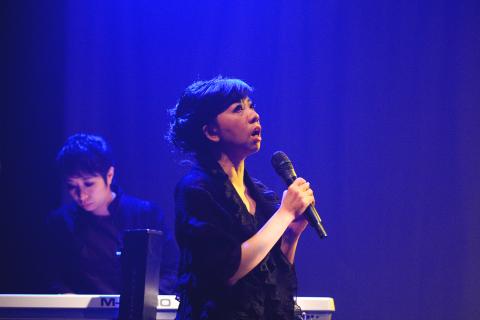Following the tradition of hosting year-end banquets, known as weiya (尾牙) parties, the Guling Street Avant-garde Theatre (GLT, 牯嶺街小劇場) will stage weiya celebrations tomorrow evening with a series of music performances, audio-visual shows and a dinner party.
“We turn the spotlight on musicians who usually play supporting roles in theatrical performances. They will create their own shows and play the leads,” theater director Yao Li-qun (姚立群) said.
The year-end festivities will begin at 6pm with a reception offering a selection of hors d’oeuvres, pizza and quiches.

Photo courtesy of GLT
At 7pm, percussionist Lei Hsu-kuang (雷煦光) and guitarists Wang Yung-hung (王永宏) and Wang Shang-chieh (王上頡) take the stage.
“We just keep jamming, playing everything from Scandinavian post rock to American blues. Our plan right now is to make a five-minute gig out of several hours of our jamming sessions,” Wang Yung-hung said.
The set by Malaysian artist Au Sow Yee and musician Alison will be more akin to an audio-visual performance and involves Au’s experimental images and Alison’s chanting.

Photo courtesy of GLT
Taiwanese musician Sandra Li (李婉菁), a former keyboard player with heavy metal band Chthonic (閃靈), will team up with activist rapper Chang Jui-chuan (張睿銓), DJ Point, soprano Chen Wen-yu (陳文鈺), baritone Arai Toshimasa and pianist Chuang I-ting (莊貽婷) to put together a hybrid concert of classical music, hip-hop and heavy metal sounds against a visual backdrop created by VJ Nina Sky and her team.
For GLT, it is also the time for the year-end review. Each year, the theater invites ten judges to watch the performances that take place at GLT throughout the year and select the best productions.
Groups that make it to the nomination list are awarded free use of the theater’s rehearsal room for a limited period of time. Winning troupes can stage a production for one week at GLT for free.
This year, two top groups will be selected from 12 finalists, and the winners will be announced at the dinner party, which is slated to begin at 8pm.
Nominees include M.O.V.E. Theatre (動見体劇團) and its Force Quit (強力斷電), Party Theater Group’s (同黨劇團) 2012 An Obituary Written by Everybody (二0一二大家一起寫訃文) and A Wordless Drama 2012 (無言劇2012) by Oz Theatre Company (柳春春劇社).
“If you want money, we probably don’t have it. But we can offer our space for free. It is our way to encourage Taiwan’s ‘little’ theater,” Yao said.
Ho Theatre (和劇場), the 2011 winner, will re-stage its Chronology on Death (死亡紀事) in April when GLT re-opens after a three-month-long renovation, which is scheduled to begin immediately after the year-end concert.
Tickets are NT$400 and include the show and reception. For an extra NT$200, audiences can go to the dinner party hosted by experimental electronica musician and noise maker Dawang Yingfan Huang (黑狼黃大旺), but reservations need to be made in advance.
For more information, visit www.glt.org.tw, or call (02) 2391-9393.

Desperate dads meet in car parks to exchange packets; exhausted parents slip it into their kids’ drinks; families wait months for prescriptions buy it “off label.” But is it worth the risk? “The first time I gave him a gummy, I thought, ‘Oh my God, have I killed him?’ He just passed out in front of the TV. That never happens.” Jen remembers giving her son, David, six, melatonin to help him sleep. She got them from a friend, a pediatrician who gave them to her own child. “It was sort of hilarious. She had half a tub of gummies,

June 23 to June 29 After capturing the walled city of Hsinchu on June 22, 1895, the Japanese hoped to quickly push south and seize control of Taiwan’s entire west coast — but their advance was stalled for more than a month. Not only did local Hakka fighters continue to cause them headaches, resistance forces even attempted to retake the city three times. “We had planned to occupy Anping (Tainan) and Takao (Kaohsiung) as soon as possible, but ever since we took Hsinchu, nearby bandits proclaiming to be ‘righteous people’ (義民) have been destroying train tracks and electrical cables, and gathering in villages

The wide-screen spectacle of Formula One gets a gleaming, rip-roaring workout in Joseph Kosinski’s F1, a fine-tuned machine of a movie that, in its most riveting racing scenes, approaches a kind of high-speed splendor. Kosinski, who last endeavored to put moviegoers in the seat of a fighter jet in Top Gun: Maverick, has moved to the open cockpits of Formula One with much the same affection, if not outright need, for speed. A lot of the same team is back. Jerry Bruckheimer produces. Ehren Kruger, a co-writer on Maverick, takes sole credit here. Hans Zimmer, a co-composer previously, supplies the thumping

Swooping low over the banks of a Nile River tributary, an aid flight run by retired American military officers released a stream of food-stuffed sacks over a town emptied by fighting in South Sudan, a country wracked by conflict. Last week’s air drop was the latest in a controversial development — private contracting firms led by former US intelligence officers and military veterans delivering aid to some of the world’s deadliest conflict zones, in operations organized with governments that are combatants in the conflicts. The moves are roiling the global aid community, which warns of a more militarized, politicized and profit-seeking trend